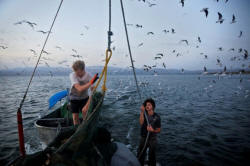|
 Sea
of Galilee draws faithful despite receding waters Sea
of Galilee draws faithful despite receding waters
 Send a link to a friend
Send a link to a friend
[December 21, 2016]
By Ronen Zevulun
SEA OF GALILEE, Israel
(Reuters) - On the shimmering Sea of Galilee, where the
Christian gospels say Jesus walked on water, 150
Nigerian pilgrims aboard a river boat sing and dance to
an African beat.
|
|
 Their pastor, Reverend Samuel Tunde Ogunmodede, said he and
his congregation had come to the biblical lake to see what they
had, until now, only read about in the scriptures. Their pastor, Reverend Samuel Tunde Ogunmodede, said he and
his congregation had come to the biblical lake to see what they
had, until now, only read about in the scriptures.
"We came here to seek the face of God, pray to God as he did in
the time of the disciples. We will pray here so that he will do
the same in our lives," he said on board the boat.
About 1 million tourists from abroad visit the Sea of Galilee,
also known as Lake Tiberias or Kinneret, each year, according to
the Israeli Tourism Ministry.
Stretching about 65 sq miles (170 square km) from the foot of
the Israeli-occupied Golan Heights, the Sea of Galilee, at its
southern tip, spills into the Jordan River, where Jesus is
believed to have been baptized.
On a crisp winter day, worshippers from Singapore, Nigeria and
Germany performed their own baptism ceremonies in the waters.

For a photo essay, click here: http://reut.rs/2iayJIS
The gospels tell of Jesus walking on the lake to comfort and
save disciples as their ship was foundering in a storm and
miraculously producing huge catches of fish for their nets.
But the Sea of Galilee may need a few more miracles these days.
A sharp drop in annual rainfall in the northern Galilee region
over the past three years has caused the lake's waters to
recede, according to Israel's Water Authority. It is now at its
lowest in five years.
[to top of second column] |

This has created problems for the largest freshwater lake in Israel,
which is a water resource for the country's north and neighboring
Jordan, a tourist hot-spot and a main fishing zone.
Receding water levels means higher salt levels, which harm the
eco-balance and could render the water unusable.
In an effort to control the damage, only a 10th of the annual
average quantity of water supply has been drawn from the lake this
year, Water Authority spokesman Uri Schor said. And in a complex
operation, salt water springs are found and their flow is diverted
out of the lake.
To better keep the eco-balance and maintain water quality, the lake
is stocked with millions of fish every year, Schor said.
The Sea of Galilee has in the past provided up to a third of
Israel's water. Because of its grave situation it now supplies a
fraction of the country's water. Israel relies now on the more
expensive methods of desalination and recycling for more than half
its water supply.
(Writing by Maayan Lubell; Editing by Jeffrey Heller and Alison
Williams)
[© 2016 Thomson Reuters. All rights
reserved.] Copyright 2016 Reuters. All rights reserved. This material may not be published,
broadcast, rewritten or redistributed.
 |